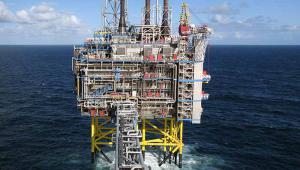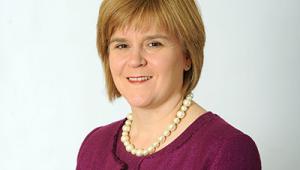According to the annual review, Scotland’s net fiscal deficit was £16.7bn or 9.7% of GDP, compared with UK figures of £89bn and 4.9%. This includes a notional share of North Sea revenues, without which the Scottish deficit would be £16.7bn or 11.9% of GDP.
The figures prompting claims from opposition parties that the Scottish National Party’s economic case for independence lies in ruins, but first minister Nicola Sturgeon said 3.2% growth in onshore tax revenues and a per capita tax take, including North Sea revenues, broadly in line with the UK figure showed fundamental economic performance remained strong.
The figures put public spending in Scotland during 2014/15 at £68bn: an average spend per head of around £12,800, some £1,400 per person more than the UK average. Per capita tax receipts are around £10,000 per person, marginally below the UK average, even with North Sea revenues included.
In past years, oil revenues had put the Scottish per capita tax take ahead of the UK figure: by £400 per head in 2013/14, £700 in 2012/13 and £1,300 in 2011/12. This has enabled the SNP to argue that, taking oil from Scottish waters into account, Scotland made a net per capita contribution to UK public finances.
The disappearance of this differential was seized on by the SNP’s unionist opponents. Scottish Labour leader Kezia Dugdale claimed an independent Scotland would have needed to make spending cuts “five times more than those being imposed now by George Osborne”. She said: “People were misled by the SNP in the run-up to the referendum and that is unforgivable."
Scottish Conservative finance spokesman Murdo Fraser said it highlighted “the SNP’s deception” during the referendum. “Had their con succeeded, we would now be only 15 days away from separating the most successful political Union in history in favour of a leap into the dark.” Scottish Liberal Democrat Leader Willie Rennie said the figures “smashed to smithereens” Sturgeon’s credibility.
Patrick Harvie, co-convenor of the Scottish Greens, took a different tack, arguing that the figures showed the need to diversify away from oil: “We simply cannot afford to wait around timidly while more jobs are lost in the oil industry. Scotland needs bold investment and industrial policy that will make us a leader in the industries of the future.”
But Sturgeon insisted that underlying economic performance remained strong: “Taken in the context of the wider economic environment, which has been impacted by muted global demand, falling oil prices and more difficult conditions for manufacturers, the economy has remained resilient with record levels of employment, positive economic growth and growing exports.
“This shows that the foundations of Scotland’s economy are strong and that we have a strong base to build our future progress upon,” she added, claiming that the figures also supported the SNP strategy of investing for future growth “with spending per head on economic development in Scotland more than twice the UK average.”
Her deputy, finance secretary John Swinney, urged the chancellor George Osborne to support the oil industry in next week’s UK Budget, by removing fiscal barriers to exploration and enhanced oil recovery, improving tax relief on decommissioning and asset transfers, and providing loan guarantees.
“The North Sea needs urgent help from the UK government, both for the sake of the industry and the wider economy,” Swinney said.




















